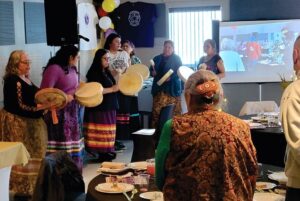Sheshegwaning First Nation celebrates historic Governance Agreement approval signing

By Kirk Titmuss
SHESHEGWANING FIRST NATION – “Tonight is a very special night. It’s historic.”
That’s how Anishinabek Nation Governance Commissioner Patrick Madahbee summed up the memorable evening held in Sheshegwaning First Nation’s Community Complex March 18, 2024. About 60 citizens turned out to the festive event to enjoy a meal, listen to presentations, and celebrate their successful support for the Anishinabek Nation Governance Agreement (ANGA) Act.
“Sheshegwaning led the charge on something that’s going to be probably impacting First Nations right across Canada,” Madahbee told the gathering.
The ANGA – a historical agreement between Canada and the Anishinabek Nation – recognizes the First Nation’s right to chart its own course under four pillars of governance: leadership selection, language and culture, citizenship, and management and operations. Sheshegwaning accepted the Agreement in 2020 using its own decision-making process; however, Canada did not accept the result as it failed to meet a voter threshold set out in the federal government’s original ratification regulations.
An amendment – Schedule C -Protocol for the Addition of a First Nation as a Party to the Anishinabek Nation Governance Agreement – was made in December 2023 – led by Sheshegwaning’s precedent-setting refusal to hold another vote using the threshold. As a result, Canada agreed to all Anishinabek First Nations’ decision-making processes, regardless of how they reached consensus for the Governance Agreement. Madahbee said the Agreement Act empowers First Nations and helps move them out from under Canada’s colonial umbrella.
“For over 150 years, they’ve been telling us what to do and controlling our lives from cradle to grave. And now we’re starting the steps to getting out of the Indian Act.”
Sheshegwaning Deputy Chief Ann Cada – sitting in for Chief Alana Endanawas, who was unable to attend – spoke proudly of what accepting the Agreement means to her community going forward.
“I remember as a teenager wondering why we don’t run our own reserve. And here we are. We’re at this point where we’re going to have a say in what we do. This is very significant for us. It is very important. And as members, we will be heard; that includes off-reserve members. Everyone will be heard. Everyone will be considered. This is your governance. This is your nation.”
Community Elder Joseph Laford, who drummed and sang at the event, said he was very happy with his community taking the stance it did, supporting the Agreement on its own terms. He now looks forward to how it will help shape Sheshegwaning’s future.
“It’s been a long time coming as far as governance is concerned for our own people governing themselves. We’ve been wanting to do this as part of our recovery process. We’re going to have a better say in who our leadership is and what we can do instead of under the Indian Act, knowing what we do and how we do it and that sort of thing. This is our own people doing our own thing in the way we’re supposed to. We’ve been able to do it for years and years and it’s just a matter of following our culture and our traditions again.”
That sentiment was echoed by B’Maakonigan CEO, Leslie McGregor, who spoke to attendees via Zoom. B’Maakonigan is the governing body that helps signatory First Nations implement the Governance Agreement’s policies in their communities. McGregor talked about the importance of clans and their role in traditional governance.
“I believe when we are planning for our future, especially when we are looking at the next seven generations, this is the foundation of how communities advance.”
Commissioner Madahbee wrapped up his address, once again congratulating Sheshegwaning citizens in attendance for supporting the Agreement and passed along a little parable based on his nearly 20 years as a chief.
“There’s three types of people in our communities. There’s those like you that show up, that want to make things happen. There’s another group that sort of just sit back and kind of watch what’s going on and see what’s happening, and then there’s a bunch that wake up one morning and say, ‘What … happened?!’ You need to be in that first group. You need to make things happen. And that’s what you’re doing here in Sheshegwaning by moving the yardsticks on this governance for your community.”


